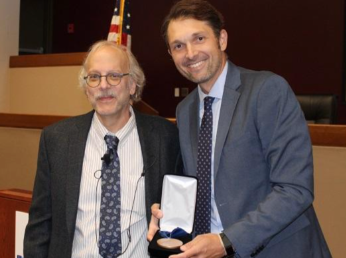
Contact Us





College of Law
1000 E. University Ave., Dept 3035
Laramie, WY 82071
Phone: 307-766-6416
Email: lawadmis@uwyo.edu
Pace University Taps Kalen for Prestigious Environmental Law Lecture
Published October 20, 2023
By Pace University Communications

Professor Jason Czarnezki presenting the 2023 Gilbert and Sarah Kerlin Lecture
Award. Kalen’s career has included serving in the Solicitor’s Office at the Department
of the Interior during the Clinton administration. Photo: Pace University
On Tuesday, October 3, 2023, Sam Kalen delivered the annual Gilbert and Sarah Kerlin Lecture on Environmental Law. Professor Kalen is the William T. Schwartz Distinguished Professor of Law and Associate Dean at the University of Wyoming College of Law, as well as the founder and co-director of the School’s Center for Law and Energy Resources in the Rockies. Also, he is currently the Visiting McKinney Family Chair in Environmental Law at Indiana University McKinney School of Law. The topic of his lecture was “The Supreme Court’s Approach Toward the Administrative State and Implications for Environmental Programs.”
Dean of the Elisabeth Haub School of Law at Pace University Horace E. Anderson Jr. said, “We are consistently honored to host top scholars, dignitaries, attorneys, experts, and leaders in public service, such as Professor Kalen, to speak to our community about current environmental challenges and importantly, solutions to those challenges. This knowledge is fundamental to our understanding of how we apply the rule of law to impact not just us as individual humans, but also our planet.”
Professor Kalen started his lecture by noting that it was fitting to have a lecture about the Supreme Court as the Court’s term just started. In particular, a discussion about how the judiciary is deciding cases and how those decisions may implicate environmental cases and laws moving forward was warranted given that there are at least three cases set to go before the Supreme Court this year that seek to curb the power of federal agencies.
Throughout the lecture, Professor Kalen shared his concern for the future of the environmental administrative state. “Some of what I may say can be considered depressing for those that cherish our environmental programs,” said Professor Kalen. A focus of Professor Kalen’s lecture was detailing specific environmental law cases, both historical, and more recent, and how the Court at the time approached the administrative state and looking towards the present cases before the Court and future.
Professor Kalen went on to note that the recent case, Sackett v. EPA, is one of the most momentous decisions issued by the Supreme Court narrowing the scope of the Clean Water Act. In this case, the Court considered whether the 9th circuit applied the appropriate test to determine whether Sackett’s property contained wetlands that are “adjacent wetlands” as regulated by the Clean Water Act. While the case deals with the Clean Water Act, he notes, it reduces related environmental rights and the scope of agencies. “Sackett also does something else,” he notes. “It illustrates the Court’s approach towards the administrative state and suggests a greater involvement by the judiciary shifting more power to the courts when interpreting statutes and for our purposes, environmental statutory law.”
“Environmental programs function as a consequence of how the modern administrative state operates,” he said. “Agencies need flexibility to address new and emerging environmental threats and concerns.” Of primary concern, Professor Kalen notes, is that through cases like Sackett, the Supreme Court has employed methods to chip away at the modern administrative state. Professor Kalen’s lecture detailed that recent cases brought before the courts involve three things regarding administrative agencies (1) agency structure; (2) agency authority and flexibility; and (3) the malleability of modern statutory construction.
Professor Kalen concluded his lively lecture, by noting that what a case like Sackett has done is “basically give the power over to the judiciary to interpret language and not give deference to agencies, and the minute it does that, it hinders agencies' ability to move forward in a progressive way.”
After the lecture, the discussion continued. In response to an audience question regarding what we can do to move forward in a positive manner, Professor Kalen honestly answered that he does believe we are in trouble. “I think right now the courts are outcome-driven. Regardless of how the language is drafted, what we are seeing is judicial opinions doing very strange things from a statutory construction perspective. I wish I could say otherwise or that these are principled decisions, but I think it is difficult for some of us to say that they are, in fact, principled decisions.”
Following the lecture, a reception was held in which the community at Elisabeth Haub School of Law at Pace University had the opportunity to the continue the conversation with Professor Kalen and one another.
The Elisabeth Haub School of Law established the Gilbert and Sarah Kerlin Lecture on Environmental Law to expand its programs of research, education, professional and scholarly activity and publications in environmental law, a field for which the law school has received national and international recognition. The Kerlin endowment funds a named professorship on Environmental Law at Haub Law. Professor Nicholas A. Robinson, founder of the Haub School's environmental programs, was named the first Gilbert and Sarah Kerlin Distinguished Professor in 1999 and Professor Jason J. Czarnezki was designated as the second Kerlin Distinguished Professor in 2013. The last Kerlin lecture was given by U.S. Environmental Protection Agency General Counsel Jeffrey Prieto.
Contact Us





College of Law
1000 E. University Ave., Dept 3035
Laramie, WY 82071
Phone: 307-766-6416
Email: lawadmis@uwyo.edu
